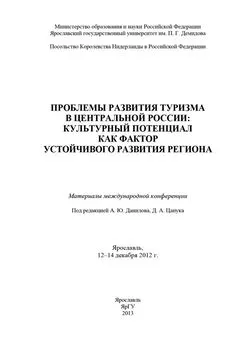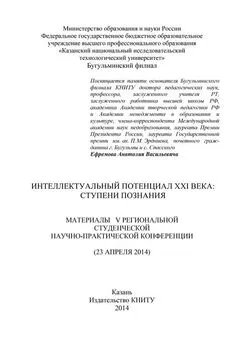Коллектив авторов - Личностный потенциал. Структура и диагностика
- Название:Личностный потенциал. Структура и диагностика
- Автор:
- Жанр:
- Издательство:Смысл
- Год:2011
- Город:Москва
- ISBN:978-5-89357-28
- Рейтинг:
- Избранное:Добавить в избранное
-
Отзывы:
-
Ваша оценка:
Коллектив авторов - Личностный потенциал. Структура и диагностика краткое содержание
Коллективная монография охватывает широкий круг вопросов психологии личности через призму новой концепции личностного потенциала – системы характеристик личности, лежащих в основе успешной саморегуляции в различных сферах жизнедеятельности.
Адресуется психологам.
Личностный потенциал. Структура и диагностика - читать онлайн бесплатно ознакомительный отрывок
Интервал:
Закладка:
Шепелева Е.А. Особенности учебной и социальной самоэффективности школьников: Автореф. дис. … канд. психол. наук. М.: Моск. ун-т, 2008.
Ялтонский В. М., Сирота Н.А. Психология совладающего поведения: развитие, достижения, проблемы, перспективы // Совладающее поведение. Современное состояние и перспективы / Под ред. А.Л. Журавлева, Т.Л. Крюковой, Е.А. Сергиенко. М.: ИП РАН, 2008. С. 21–54.Antonovsky A. The Sense of Coherence as a Determinant of Health // Behavioral Health: a Handbook of Health Enhancement and Disease Prevention / J.D. Matarazzo, N. Miller (Eds.). N.Y.: Wiley, 1984. P. 194–202.
Antonovsky A. The Life Cycle, Mental Health and the Sense of Coherence // Israel Journal Psychiatry. 1985. Vol. 22. № 4. P. 273–280.
Bandura A. Human agency in social cognitive theory // American Psychologist. 1989. Vol. 44 (9). P. 1175–1184.
Bedi G., Brown S. Optimism, coping style and emotional well-being in cardiac patients // British Journal of Health Psychology. 2005. Vol. 1. P. 57–70.
Bouchard G., Guillemette A., Landry-Leger N. Situational and dispositional coping: an examination of their personality, cognitive appraisals and psychological distress // European Journal of Personality. 2004. Vol. 18. P. 221–238.
Bowman G., Stern M. Adjustment tooccupational stress: the relationship of perceived control to effectiveness of coping strategies // Journal of Councelling Psychology. 1995. Vol. 42 (3). P. 294–303.
Brown S. P., Westbrook R.A., Challagalla G. Good Cope, Bad Cope: Adaptive and maladaptive doping strategies following a critical negative work event // Journal of Applied Psychology. 2005. Vol. 90. № 4. P. 982–798.
Carver C.S. You want to measure coping but your protocol’s too long: Consider the Brief COPE // International Journal of Behavioral Medicine. 1997. Vol. 4. P. 92—100.
Carver C. S., Connor-Smith J. Personality and Coping // Annual Review of Psychology. 2010. Vol. 61. P. 679–704.
Carver C. S., Scheier M.F. A control-process perspective on anxiety // Anxiety. Research: An International Journal. 1988. Vol. 1. P. 17–22.
Carver C.S., Scheier M.F., Weintraub J.K. Assessing coping strategies: A theoretically based approach // Journal of Personality and Social Psychology. 1989. Vol. 56. P. 267–283.
Cheng C., Cheung M. Cognitive processes underlying coping flexibility: differentiation and integration // Journal of Personality. 2005. Vol. 73 (4). P. 859–880.
Clark K. C., Bormann C., Cropanzano R., James K. Validation evidence for three coping measures // Journal of Personality Assessment. 1995. Vol. 65 (3). P. 434–455.
Compas B. An agenda for coping research and theory: basic and applied developmental issues / International Journal of Behavioral Development. 1998. Vol. 22 (2). P. 231–237.
Compas B.E., Banez G.A., Malcarne V., Worsham N. Percieved control and coping with stress: a developmental perspective // Journal of Social Issues. 1991. Vol. 47 (4). P. 23–34.
Compas B.E., Ey, S., Worsham, N.L., Howel, D.C .. When mom and dad has cancer: II. Coping, cognitive appraisals and psychological distress in children of cancer patients // Child Development. 1996. Vol. 15. P. 167–175.
Compa, B.E., Connor-Smith J., Saltzman S., Thomsen A., Wadsworth S. Coping with stress during childhood and adolescence: problems, progress, and potential in theory and research // Psychological Bulletin. 2001. Vol. 127 (1). P. 87—127.
Connor-Smith J.K., Flachsbart C. Relations between personality and coping: a meta-analysis // Journal of Personality and Social Psychology. 2007. V. 93. P. 1080–1107.
Costa P.T., Somerfield M.R., McCrae R.R. Personality and coping: A reconceptualizatio / Handbook of coping: Theory, research, applications / M. Zeidner, N.S. Endler (Eds.). N.Y.: Wiley, 1996. P. 44–61.
Cramer P. Coping and defensive mechanisms: What’s the difference? // Journal of Personality. 1998. Vol. 66. P. 919–946.
Dolbier K., Smith S., Steinhardt M. Relationships of protective factors to stress and symptoms of illness // American Journal of Health Behavior. 2007. Vol. 31 (4). P. 423–433.
Donaldson D., Prinstein M.J., Danovsky M., Spirito A. Patterns of children’s coping with life: Implications for clinicians. // American Journal of Orthopsychiatry. 2000. Vol. 70. P. 351–359.
Dubow E.F., Tisak J. The relation between stressful life events and adjustment in elementary school children: The role of social support and social problem-solving skills // Child Development. 1989. Vol. 60. P. 1412–1423.
Edwards S. Physical exercise and psychological well-being // South African Journal of Psychology. 2006. Vol. 36 (2). P. 357–373.
Eisenberg N., Fabes R.A., Murphy B., Maszk P., Smith M., Karbon N. The role of emotionality and regulation in children’s social functioning: A longitudinal study / Child Development. 1995. Vol. 66. P. 1239–1261.
Endler N.S., Parker J.D. Multidimensional Assessment of Coping: A Critical Evaluation // Journal of Personality and Social Psychology. 1990. Vol. 58 (5). P. 844–854.
Folkman S., Moscowitz J. Coping: pitfalls and promise // Annual Reveiw of Psychology. 2004. Vol. 55. P. 775–774.
Folkman S., Schaefer C., Lazarus R. Cognitive Processes as Mediators of Stress and Coping // Human Stress and Cognition: An information processing approach. Chapter 9 / V. Hamilton, D.M. Warburton (Eds.). Chichester: Wiley, 1979. P. 265–298.
Fontaine K., Manstead A., Wagner H. Optimism, perceived control over stress and coping // European Journal of Personality. 1993. Vol. 7. P. 267–281.
Franks H., Roescher M. Appraisals and coping in people living with cancer: a meta-analysis // Psycho-oncology. 2006. Vol. 15. P. 1027–1037.
Fry P. S. Perfectionism, humor and optimism as moderators of health outcomes and determinants of coping // Genetic, Social & General Psychology Monographs. 1995. Vol. 121 (2). P. 34–52.Frydenberg, E., Lewis, R. The Adolescent Coping Scale: Multiple forms and applications of a self report inventory in a counselling and research context // European Journal of Psychological Assessment. 1996. Vol. 12. P. 224–235.
Frydenberg E., Lewis R . Teaching Coping to adolescents: when and to whom? // American Educational Research Journal. 2000. Vol. 37. № 3. P. 727–745.
Geist-Martin P., Ray E.B., Sharf B.F. Communicating health: Personal, cultural and political complexities. – Belmont: Wadsworth/Thomson Learning, 2003.
Greenglass E.R., Schwarzer R., Taubert S . The Proactive Coping Inventory (PCI): A Multidimensional Research Instrument. 1999. URL: http://www.psych.yorku.ca/greenglass/
Hardie E., Critchley C., Morris Z . Self-coping complexity: role of self-construal in relational, individual and collective coping styles and health outcomes // Asian Journal of Social Psychology. 2006. Vol. 9. P. 224–235.
Heijmans M., Rijeken M., Foets M., de Ridder D., Schreurs K., Bensing J . The stress of being chronically ill: from desease-specific to task-specific aspects // Journal of Behavioral Medicine. 2004. Vol. 27 (3). P. 255–270.
Hobfoll S.E. Stress, culture, and community: The psychology and philosophy of stress. N.Y.: Plenum, 1998.
Hutchinson S., Baldwin C., Oh S. Adolescent coping: exploring adolscents’ leisure-based responses to stress // Leisure Sciences. 2006. Vol. 28. P. 115–131.
Johnson M. Approaching the salutogenesis of sense of coherence: the role of ‘active’ self-esteem amd coping // Behavioral Journal of Health Psychology. 2004. Vol. 9. P. 419–432.
Kopp C. Antecedents of self-regulation: A developmental perspective // Developmental Psychology. 1982. Vol. 18. P. 199–214.
Kuiper N., Martin R. Laughter and stress in daily life: relation to positive and negative affect // Motivation and Emotion. 1998. Vol. 22 (2). P. 133–152.
Lambert V., Lambert C., Petrini M., Xiao M., Zhang Y. Workplace and social factors associated with physical and mental health in hospital nurses in China // Nursing and Health Sciences. 2007 a . Vol. 9. P. 120–126.
Lambert V., Lambert C., Petrini M., Li X., Zhang Y. Predictors of physical and mental health in hospital nurses withing the people’s Republic of China // International Nursing Review. 2007 b. Vol. 54. P. 85–91.
Lazarus R.S. Coping theory and research: Past, present, and future // Psychosomatic Medicine. 1993. Vol. 55. P. 234–247.
Lazarus R . Emotions and interpersonal relationships: toward a person-centered conceptualization of emotions and coping // Journal of Personality. 2006. V. 74. № 1. P. 9—43.
Lazarus R., Folkman S . Stress, appraisal and coping. N.Y.: Springer, 1984.
Losoya S., Eisenberg N., Fabes R . Developmental issues in the study of coping // International Journal of Behavioral Development. 1998. Vol. 22 (2). P. 287–313.
MacCrae R., Costa P. Personality, coping and coping effectiveness in an adult sample // Journal of Personality. 1986. Vol. 54 (2). P. 385–405.
Maddi S. Creating Meaning Through Making Decisions // Wong P.T.P., Fry P.S. The Human Quest For Meaning: A Handbook of Psychological Research and Clinical Applications. Mahwah (NJ): Lawrence Erlbaum Associates, 1998 a . P. 1—26.
Maddi S. Dispositional Hardiness in Health and Effectiveness // Encyclopedia of Mental Health / H.S. Friedman (Ed.). San Diego (CA): Academic Press, 1998 b . P. 323–335.
Maddi S. The Personality Construct of Hardiness: Effects on Experiencing, Coping and Strain // Consulting Psychology Journal: Practice and Research. 1999. Vol. 51. № 2. P. 83–94.
Maddi S., Kobasa S. The hardy executive: Health under stress. Homewood (IL): Dow Jones-Irwin, 1984.
Meichenbaum D. Stress inoculation training. N.Y.: Pergamon Press, 1985.
Meichenbaum D. Stress inoculation training: A twenty year update // Principles and practices of stress management / R.L. Woolfolk, P.M. Lehrer (Eds.). N.Y.: Guilford Press, 1993.
Miller S.M., Green M.L .. Coping with stress and frustration: Origins, nature and development // The socialization of emotions / M. Lewis, C. Saarni (Eds.). N.Y.: Plenum, 1985. P. 263–314.
Miceli M. Castelfranchi C. Further distinction between coping and defensive mechanisms // Journal of Personality. 2001. Vol. 69. № 2. P. 287–296.
Moos R.H., Holahan C.J. Dispositional and Contextual Perspectives on Coping: Toward an Integrative Framework / Journal of Clinical Psychology. 2003. Vol. 59. P. 1387–1403.
Pollard C., Kennedy P. A longitudinal analysis of emotional impact, coping strategies and post-traumatic psychological growth following spinal cord injury: a 10-year review // British Journal of Health Psychology. 2007. Vol. 12. P. 347–362.
Ptacek J.T., Smith R.E., Zanas J. Gender, appraisal and coping: a longitudinal analysis // Journal of personality. 1992. Vol. 60 (4). P. 747–768.
Rowe M . Four-year longitudinal study of behavioral change in coping with stress // American Journal of Health Behavior. 2006. Vol. 30 (6). P. 602–612.
Читать дальшеИнтервал:
Закладка:










